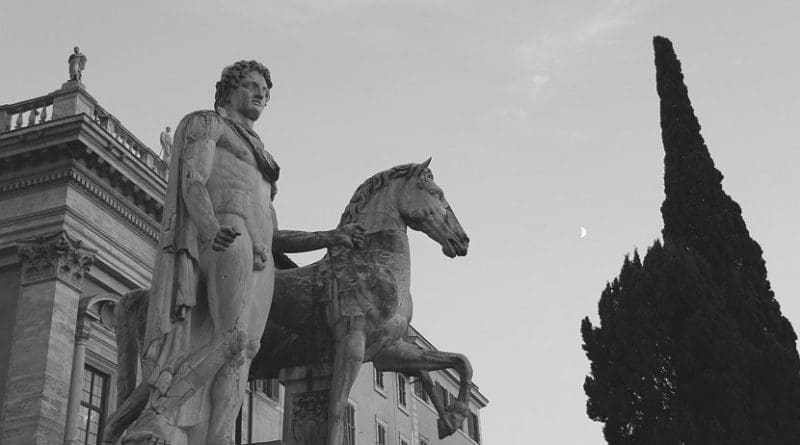Rejuvenated Italy Finds Its Voice And Says ‘No’ – OpEd
By Arab News
By Max Ferrari*
Matteo Salvini, Italy’s new deputy prime minister and strongman of the populist government, effectively summarized what happened in the last week when he said: “Italy has finished obeying and lowering its head — this time we say no.” The statement was addressed to the top of the EU and came from a country that had previously been the bloc’s weak and blackmailed partner. Rome has now become a leader among the nations standing up to the Brussels elite; and it carries far greater weight than the Central and Eastern European countries that previously led the protests.
The issue that triggered the rage of Rome was immigration. After winning the elections by promising to stop the landings of illegal immigrants from Africa, Salvini, who is also minister of interior, said “the game is over” as he spoke of the 600,000 migrants who have illegally reached Italy in the past five years. This is a sentence disputed by the Italian left, but the message was received by German Chancellor Angela Merkel, who admitted that Italy had been left alone to face a huge problem during the 2015 crisis.
However, Brussels’ promises for change were not followed by action and, in front of a sea full of boats bound for Sicily, and with the prospect of a long summer of landings, Salvini reacted. He said: “In the Mediterranean there are ships with the flag of Holland, Spain, Gibraltar and Great Britain, there are German and Spanish NGOs, there is Malta that does not welcome anyone, France that pushes people back at the border, Spain defends its frontier with weapons. In short, all of Europe is doing its own business. From today, Italy will also start to say no to human trafficking, no to the business of illegal immigration. My goal is to secure a peaceful life for these youths in Africa and for our children in Italy.”
At the center of the dispute was the Aquarius ship, run by a French NGO, which, according to Rome, should have been accepted by Malta. It was eventually accepted by Spain after Salvini requested and obtained the closure of Italian ports to ships run by NGOs, which it accused of doing business with the people smugglers.
What is certain is that, as soon as the Italian minister launched the hashtag “we are shutting the ports,” the internet went crazy. While the media condemned him, the people on the street are behind him, as shown by the municipal elections on Sunday and the surveys that indicate support for the League party, led by Salvini, is growing. It seems destined to be the first Italian party able to lead all European populists.
Merkel understands this and, after having opposed the populists, she has now adapted and will work with them, starting with her Hungarian counterpart Viktor Orban. In a TV interview, the German chancellor said: “Hungary has a Schengen external border and does work for us. It is in a similar situation as Greece and Italy, just with a land border that is more easily secured.”
Previously, protests against Brussels involved only relatively powerless countries like Hungary, Poland, Czechia and Slovakia, but now, with the arrival of Rome and the new axis between Italy and Austria, the balance has changed and even Germany could be overwhelmed by a populist tsunami. While French President Emmanuel Macron accused Italy of irresponsibility over the Aquarius incident, the German Interior Minister Horst Seehofer has invited Salvini to Berlin.
Rome can also count on English sympathies and on US President Donald Trump who, at the G7 summit in Canada, had cold relations with almost everyone but was particularly warm with new Italian Prime Minister Giuseppe Conte. The latter was the only one to support Trump’s idea of recalling Russia to the G8 and he has now been invited to the White House.
Some say that, in the spat between Washington and Berlin, Rome will be the great ally of the Americans in limiting German power in Europe. What is certain is that Italy has returned to the table of great protagonists and will voice its opinions, particularly on the Mediterranean, which cannot be treated as a French lake.
In fact a diplomatic incident with Paris immediately erupted: Macron called Italy “cynical and irresponsible,” and Salvini replied by recalling how France has welcomed only 640 of the 9,816 migrants it had promised to take from Italy. He said: “We face a situation of destabilization in Libya and Africa created by the French. They have to apologize to Italy and welcome 9,000 people straight away.”
Surely this clash has reinforced Italian national pride and consensus toward the new government. Salvini, after receiving praise from the Libyan coast guard, announced new agreements with Tunisia and Morocco and stated the need to rebuild a privileged relationship with Egypt.
Rome is back.
* Max Ferrari is a journalist and politician. He is a former parliamentary journalist, a war correspondent in the former Yugoslavia, Iraq, Afghanistan and Lebanon, and director of a TV channel. He is an expert in geopolitics and energy policy. Twitter: @MaxFerrari

